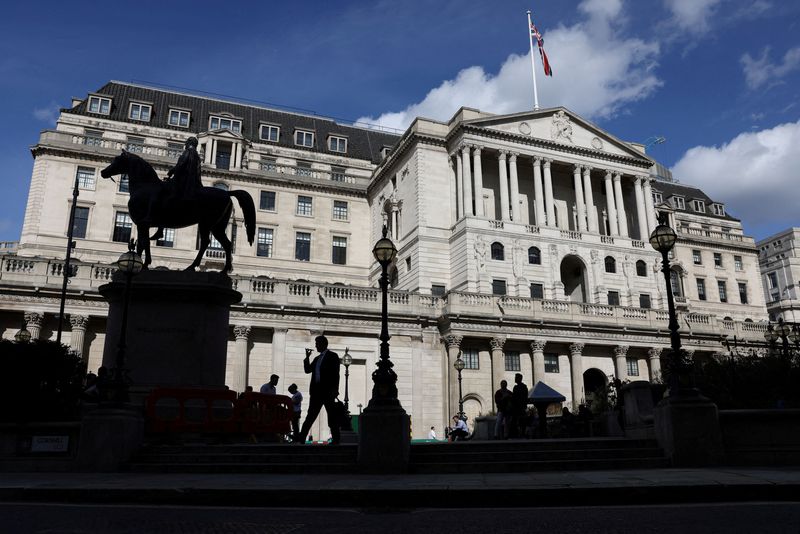By William Schomberg and Sumanta Sen
LONDON (Reuters) - The Bank of England is expected to keep interest rates at their 15-year high on Thursday as it battles an inflation rate that is more than three times as high as its target, despite growing signs of strain in the economy.
British inflation remains the highest among the world's rich economies, and the BoE's run of 14 back-to-back interest rate increases between late 2021 and August this year to contain it is hitting the housing market, jobs and consumer spending.
Below is a series of graphics showing the trade-off facing the central bank as it tries to get inflation down to its 2% target without pushing the flat-lining economy into a recession.
HIGH INFLATION FALLS SLOWLY
Consumer price inflation hit 11.1% in October 2022, which was higher than in comparable economies, and it has fallen more slowly too. It held at 6.7% in September. There was a fall in core inflation, excluding volatile fuel and food costs. But service price inflation, which the BoE watches closely, rose.
Governor Andrew Bailey said the figures were not far off the BoE's expectations. Economists expect a big fall in headline inflation in October as last year's energy price surge fades from the comparison.
However, the BoE issued a forecast in August saying inflation would return to 2% only in the second quarter of 2025. It is due to publish new forecasts on Thursday.
PAY GROWTH - SOME SIGNS OF COOLING
The fastest pay rises in at least 22 years have eased only slightly, according to official data. There are other, clearer signs that the jobs market is losing some of its inflationary heat, such as slower growth in starting pay for people hired via recruiters. Gauging the labour market has been made harder by problems at Britain's statistics office in running its surveys.
HOUSING MARKET HIT BY JUMP IN MORTGAGE COSTS
The housing market in Britain, as in many countries, boomed during the COVID-19 pandemic but the jump in mortgage borrowing costs has caused a sharp slowdown in transactions and borrowing for house purchases, adding to the drag on the broader economy. Still, the roughly 5% fall in house prices since September should be compared with their 25% leap from the start of the pandemic period to their peak.
CONSUMER SPENDING SQUEEZED
The volume of goods bought at retailers fell by almost 1% in the three months to September - the first such drop since early 2023 - with only some of it explained by unseasonal weather.
Economists said the weak data added to the risk that Britain's economy contracted in the third quarter of 2023, potentially representing the start of a recession.
A measure of consumer confidence fell sharply in October as the cost-of-living squeeze weighed heavily on households.
BOE EXPECTED TO CUT RATES AFTER FED AND ECB

The BoE said in August it was likely to keep interest rates high to ensure inflation is squeezed out of the economy, and its chief economist Huw Pill has likened the outlook to the flat and long summit plateau of Table Mountain.
So far, most investors seem to agree. Financial markets do not see a more than 50% chance of the BoE cutting Bank Rate until August 2024. By comparison, markets expect a first U.S. rate cut in June. The European Central Bank is also expected to cut borrowing costs earlier than the BoE.